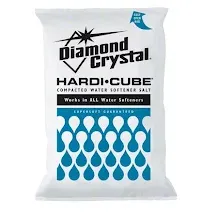Water Softener Salt Guide Series #1: Types, Benefits & Best Choice for Your System
Water softeners are essential for households dealing with hard water and iron, which can damage plumbing, reduce the efficiency and lifespan of appliances, and leave residue on dishes, clothing, and plumbing fixtures. A key component in this system is water softener salt, which helps regenerate the softener's resin beads and keep the system running smoothly to provide worry-free soft water.
Types of Water Softener Salt
Water softener salt comes in various forms, including pellets, crystals, blocks, and compacted flakes. Among these, Dura Cube and Hardi Cube salt—formed into small, compacted flakes—is popular due to its high efficiency in regeneration cycles and clean operation.
When shopping for water softener salt, consumers often encounter options like Morton, Diamond Crystal Pellet Salt, Diamond Crystal Solar Salt, Dura-Cube, and Hardi-Cube. While they may appear similar, there are notable differences in the quality, purity, and performance of your water treatment equipment.
Morton and Diamond Crystal Pellet Salt
What it is: Pellet salt is often less expensive and available in bulk from various manufacturers. It serves the basic purpose of softening water by regenerating the softener's ion-exchange resin.
Pros:
-
Lower cost
-
Available in big-box stores, grocery stores, and hardware stores
Available with iron-removing additives
Cons:
-
Contains more insoluble impurities (dirt, silt, minerals)
-
Can lead to salt bridging (hard crusts) or mushing (sludge)
-
Requires more frequent maintenance and semi-annual brine tank cleaning
What is solar salt? Solar salt is produced by evaporating seawater or brine from saltwater lakes using solar energy, leaving behind crystalline sodium chloride.
Pros:
Lower cost
Available in big-box stores, grocery stores, and hardware stores
Compatible with most water softeners
Cons:
Contains more insoluble residues that accumulate in the brine tank, forming sludge that may clog screens, injectors, or float valves.
Less soluble than sodium chloride, potentially leading to crusty deposits in the brine tank.
Requires more frequent maintenance and semi-annual brine tank cleaning to remove buildup.
Dura-Cube® Water Softener Salt
Manufacturer: Cargill
What sets it apart: Dura-Cube is a premium brand of water softener cube salt known for its high purity and durability. Dura Cube Water Softener Salt is only sold by Water Treatment Dealers.
Features:
-
Typically, 99.8% pure salt
-
Compressed under high pressure to reduce mushing and bridging
-
Available in regular, red-out (with rust remover), and potassium chloride options
-
Less insoluble material, which means cleaner operation
Best for:
-
Households looking for low-maintenance softener operation
-
Areas with high iron content (when using Red-Out Dura-Cube)
-
Protecting and extending the life of appliances
Hardi-Cube® Water Softener Salt
Manufacturer: Cargill (Diamond Crystal branding)
What sets it apart: Hardi-Cube salt is the same as Dura-Cube. It is branded under Diamond Crystal.
Hardi-Cube salt is sold by retailers and water treatment dealers. In terms of quality and target market, it may offer slightly different compressions and additives depending on the brand.
Features:
-
High-purity salt, 99.8% pure salt
-
Formulated to reduce bridging and mushing
-
Also available with additives like rust remover
Best for:
-
Consumers want high performance and reliability
-
Systems that benefit from rust-removing additives
-
Consistent, long-term water softener operation
Summary: Key Differences
Feature Pellet Salt Solar Salt Dura-Cube Hardi-Cube| Purity | Lower (varies) | ~99.6% ~99.8% ~99.8% | |
| Additives Available | (rust remover) | No (Red-Out) (Red-Out) | |
| Bridging/Mushing | Most likely | Less likely Less likely Less likely | |
| Price | Cheapest | Lower Higher Higher | |
| Maintenance Needs | High | High Low Low |
Choosing the right water softener salt isn't just about price—it's about optimizing your home's water system for reliability, water quality, and performance.
I wish you Good days and Good water!
© The Water Softener Blog - All rights reserved
For more guides on water treatment. Subscribe to the TWSB blog for expert advice on water softening, water filtration, drinking water systems, water treatment system reviews, water softener salt, DIY, water issues in the news, water and our health, how to treat your water, and comprehensive water testing. www.thewatersoftenerblog.com
For more guides on water treatment. Subscribe to the TWSB blog for expert advice on water softening, water filtration, drinking water systems, water treatment system reviews, water softener salt, DIY, water issues in the news, water and our health, how to treat your water, and comprehensive water testing. www.thewatersoftenerblog.com









.webp)








Comments
Post a Comment
The Water Softener Blog encourages your constructive comments on our blog and content. If there is a water treatment problem you would like to see discussed here please send us a suggestion and we will do our best to accommodate your request.
Thank you, Ray